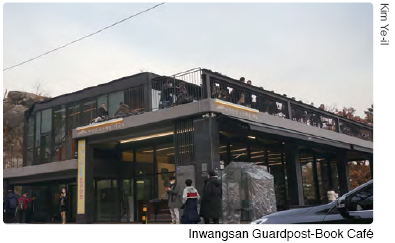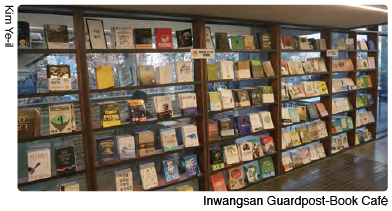In October 2021, two members of University of Seoul (UOS), a professor and an alumnus, received prestigious awards for their outstanding performance in their professional fields. Professor Lee Chung-kee of the Department of Architecture, was awarded the Korean Architecture Award for his outstanding work. The UOS alumni startup team, with its founding members Lee On (Dept. of Urban Sociology, ’14), Yoo Jun-sung (School of Business Administration, ’15), and Kim Min-kyung (School of Business Administration, ’14), was awarded in the Chung Ju-yung Startup Competition. The following excerpts are from an interview with both Professor Lee and Mr. Lee, the startup team leader.

Professor Lee Chung-kee
Q. Congratulations on winning such honorable awards. How do you define your job?
A. I am a professor. Drawing from my experience over the years as an architect, I teach architecture design to my students. A professor of architecture must be equipped with the hands-on skills that are necessary in the field, and not only in the theories in order to cultivate elite architects, just like medical school professors are required to be skilled in operating patients to teach future doctors.
Q. While doing research on your titles, I found “Honorary Mayor of Seoul” which seems to stand out. However, at the same time, this title seems unfamiliar to most of us. Can you explain it?
A. I am an Honorary Mayor of Seoul in the field of urban regeneration. Being a professor of UOS, I supported the Seoul Metropolitan Government through many consultations on urban regeneration. In recognition for my professional consultations and participation, they designated me as one of the Honorary Mayors of Seoul. There are Honorary Mayors of Seoul on 17 fields who deliver the voice of the citizens from various social classes to the mayor. It is a truly honorable opportunity to serve as the Honorary Mayor.
Q. The building you received the prize for, Inwangsan Guardpost-Book Café, definitely stands out for the fact that you remodeled the previous version of the building. Why did you avoid demolishing it altogether?
A. The original building was the guard post for the police. Ex-president Park Chung-hee, who feared infiltration from North Korea following the assassination attempt in 1968, ordered the construction of the guard post. These military facilities made it difficult for civilians to enjoy the beautiful landscape of the mountains in Seoul. Inwangsan became completely open for citizens to visit only three years ago. Instead of demolishing the guard post altogether, the Blue House wanted to turn the post into a resting space. I participated in the project as a talent donor and designed the new book café. All the walls of the Guardpost-Book Café are made of glass. The space now embraces the breathtaking vista from the mountainside.
Q. What are some of the problems in the current urban development context?
A. I believe that the coexistence of the past and the present is lacking in South Korean cities. When we develop new areas, we focus only on building as many apartments as possible, and clean out the original space in the area. Cleaning out the space means destroying the landscape and the memories associated with the area. You can see the same landscape anywhere in Seoul. Architects define people’s lives by designing their houses. With identically designed houses and villages, people’s lives are bound to be standardized, not necessarily with their consent. I think we should break away from the past trends in the pursuit of rapid development. We need to preserve the originality of the area and give the next generation a means for development.

Lee On, the Founder of Tread&Groove
Q. Congratulations on the outstanding results in the Chung Ju-yung Startup Competition. Please introduce yourself to us.
A. I am Lee On, the Founder-CEO of Tread & Groove, a startup company founded by three members of Tokkibal, the UOS Startup Club. We upcycle used tires to make shoes. Although we have majored and pursued careers in fields that are irrelevant to the fashion and/or environmental industries, we started the business with a sense of adventure. Last winter, we were funded with 12 million KRW for our Chelsea boots. This summer, we received 35 million KRW for our brand new sandals and slippers. We were introduced to the public through the press thanks to the successful funding rounds. The press releases helped us collaborate with other companies like Hankook Tire & Technology and LOTTE Rent-a-car.
Q. Can you tell us why you chose the unique path of starting a business over getting hired in a company?
A. All three founding members preferred to show initiative, irrespctive of what we were setting out to do and wanted to take responsibility for it rather than merely do what we were told to do. Therefore, we started a business rather spontaneously. We met at Tokkibal. People work for eight hours a day. This means that a third of one’s life is spent at work. I did not want to spend my time working for anyone else. That was why I chose to start my own business.
Q. Have you experienced any difficulty in preparing for your startup?
A. To be honest, we faced obstacles at every stage in preparation. When we began our journey, we were totally ignorant about both fashion and the environment. Our product was inspired by the people of a remote village in Africa who use tires as substitutes for shoes. We suffered a lot by starting with a vague idea. First of all, processing a tough tire into soft rubber was difficult. We used every tool we could get, from a boxcutter to a chainsaw, all in vain. We managed to extract pure rubber from tires, but making shoes out of it was another issue. We visited over 50 shoe workshops in Seongsu-dong, one of which agreed to help us make our first product.
Q. Have you received any help from UOS in starting the business or preparing for your competition?
A. One founding member and I majored in Entrepreneurship in UOS. Therefore, we learned how to start a business, and know what it is to conceptualize a business, a business model, and IR pitching. While managing Tokkibal, we got to attend various startup camps, lectures, and expeditions abroad. Every experience helped us.
Q. How did you differentiate your products from other recycled ones?
A. We make use of the chemical and physical properties of the original material, namely the tire. A lot of other recycled products dismantle the original material entirely to create new products, such as by melting plastics to make thread. However, we made an effort to preserve the properties of tires, in order to make the shoes tough and slip-free.
The acknowledgement for the professor proves the excellence of the faculty at UOS. The startup team has presented the students’ capability in business, not only in the public sector. The UOS Times sends the most sincere wishes to all members of UOS so that they may prosper in their chosen fields.
Kim Ye-il
lavieenrose0705@uos.ac.kr

